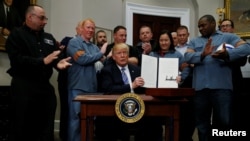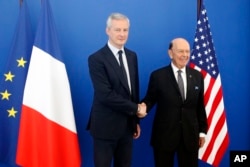The United States is escalating trans-Atlantic and North American trade tensions, imposing a 25 percent tariff on steel imports and a 10 percent tariff on aluminum imports from the European Union, Canada and Mexico beginning on Friday.
The U.S. also negotiated quotas or volume limits on other countries, such as South Korea, Argentina, Australia and Brazil, instead of tariffs, Commerce Secretary Wilbur Ross also told reporters Thursday by telephone.
China's foreign ministry said on Friday all countries should protect the normal trade order, when asked about U.S. decision.
President Donald Trump said Thursday that the days of the U.S. being taken advantage of in trade deals "are over'" in a harshly worded statement responding to Canadian Prime Minister Justin Trudeau's criticism of new steel and aluminum tariffs. He intensified his criticism of Canada Friday for what he says are the country's "highly restrictive" trade practices.
Trump has repeatedly said measures such as tariffs are necessary to protect American jobs and industries in key manufacturing sectors.
"The president's actions are about protecting American steel, American aluminum," a White House spokesman, Raj Shah, said on Fox News. "They're critical for national security."
But the negative reaction from some of America's most important strategic allies has been quick and fierce.
European Union Commissioner Cecilia Malmstrom said shortly after the tariffs took effect they were illegal and the 28-nation bloc would initiate a settlement dispute case with the World Trade Organization.
"We can do so. We have the right to do so. I think we must do so, as well, to show that we cannot just take these tariffs and stand silent and we do not accept these kind of imposed illegal tariffs," said Malmstrom.
Without elaborating, Malmstrom also said the EU would explore "rebalancing measures," which typically are retaliatory actions.
Trudeau called the tariffs "totally unacceptable" and vowed retaliation.
"This decision is not only unlawful, but it is a mistake in many respects," said French President Emmanuel Macron, warning that "economic nationalism leads to war."
France's finance minister, Bruno Le Maire, who met Ross earlier on Thursday, said the U.S. shouldn't see global trade like the Wild West or the "gunfight at the O.K. Corral."
On Friday, the White House said Trump and Macron discussed the U.S. trade imbalance during a conversation a day earlier.
"President Trump underscored the need to rebalance trade with Europe," the White House said.
‘Bad day for world trade’
European Commission President Jean-Claude Juncker said the U.S. move marked "a bad day for world trade."
The retaliatory tariffs from the Europeans are expected to target several billion dollars' worth of American goods, including such iconic American products as Harley Davidson motorcycles and Levi's jeans, as well as Kentucky bourbon and Tennessee whiskey.
Ross, in Paris, interviewed on CNBC after the announcement, brushed off the retaliation saying, "It's a tiny, tiny fraction of 1 percent" of trade.
Ross, a banker known for restructuring failed companies prior to joining Trump's Cabinet, also predicted America's trading partners "will get over this in due course."
"The United States is taking on the whole world in trade and it's not going to go well," predicted Simon Lester, trade policy analyst at the libertarian Cato Institute.
The action is also not popular with some members of Congress, including those from Trump's own party, whose states are dependent on exports.
"Imposing steel and aluminum tariffs on our most important trading partners is the wrong approach and represents an abuse of authority intended only for national security purposes," said Bob Corker of Tennessee, who is the chairman of the Senate Foreign Relations Committee.
"You don't treat allies the same way you treat opponents," Republican Senator Ben Sasse of Nebraska said on Twitter. "Blanket protectionism is a big part of why we had a Great Depression. 'Make America Great Again' shouldn't mean 'Make America 1929 Again.'"
Tennessee has three major auto assembly plants. Nebraska is a significant exporter of cattle, corn, soybeans and hogs.
Mexico said, in response, it will penalize U.S. imports, including pork bellies, apples, grapes, cheeses and flat steel.
"There's a reason why" the countries are carefully selecting which American products to target in response, said William Reinsch, senior adviser at the Center for Strategic and International Studies.
"Most of bourbon is made in Kentucky, which is the state of the Senate majority leader. Harley Davidsons are made in Wisconsin, which is the state of the speaker of the House," Reinsch told VOA News. "Usually when other countries retaliate, and the Chinese have done something similar, is they're good at maximizing political pain by picking out products that are made in places where people are politically important."
"Tariffs on steel and aluminum imports are a tax hike on Americans and will have damaging consequences for consumers, manufacturers and workers," said Republican Orrin Hatch, who chairs the Senate's finance committee and is a longtime advocate of breaking down trade barriers.
One side of equation
Expected higher prices for U.S. consumers on some products is only one side of the equation, said Ross, who noted that steel and aluminum makers in the United States are adding employment and opening facilities as a result of the U.S. government action.
"You can create a few jobs, however, you're going to lose more in the process," as consuming industries will be placed at a disadvantage of paying more for raw materials compared to their foreign competitors, Lester told VOA News.
Christine Lagarde, managing director of the International Monetary Fund, is warning a trade war will also damage public trust in leaders.
"First of all, those who will suffer most are the poorest, the less privileged people, those who actually rely on imported goods to have their living," Lagarde said at a meeting in Canada of finance ministers and central bankers of the Group of Seven nations, adding that long-standing supply chains also would be disrupted.
NAFTA sunset pact
Also Thursday, it appeared the U.S. tariffs made it less likely America, Mexico and Canada would reach an agreement on NAFTA.
Trudeau, who said he offered to meet personally with Trump to discuss the pact, said, "There was the broad lines of a decent win-win-win deal on the table."
But the Canadian prime minister said U.S. Vice President Mike Pence told him Tuesday that a precondition for meeting with Trump would be for Trudeau to agree to a five-year "sunset clause" on NAFTA. A sunset clause would allow any one of the three countries to exit the pact after five years. Trudeau said he refused.
Late Thursday, the White House said in a statement, "The United States has been taken advantage of for many decades on trade.Those days are over."
The statement said a "message was conveyed" to Trudeau that the U.S. "will agree to a fair deal, or there will be no deal at all."
Trump, in March, announced the United States would impose such tariffs, but he granted exemptions that expire Friday to the European Union and other U.S. allies.
The angst about global trade tensions helped send stock prices lower in the United States on Thursday. The Dow Jones Industrial Average fell 1 percent, while the broader S&P 500 was off nearly 0.7 percent.
Wayne Lee and Carol Castiel contributed to this report.














